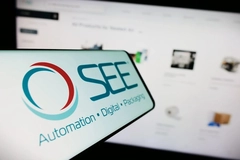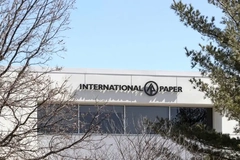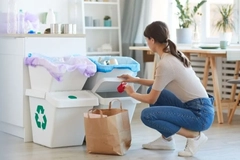Unregulated PET imports jeopardize EU circular economy, warns Plastics Recyclers Europe

09 Jun 2023 --- Unregulated PET imports are threatening the competitiveness of the EU’s plastic packaging industry and its objective to improve waste management, according to industry experts.
Between 2021-2022, global imports of PET doubled, reaching 1.9 metric megatons, finds Plastics Recyclers Europe. India, China and Turkey were among the biggest exporters in volumes and value, followed by Indonesia, Egypt and Vietnam.
Vice president at Plastics Recyclers Europe and chair of its PET working group, Casper van den Dungen, tells PackagingInsights that the lack of verification mechanisms and traceability are among the key factors causing unregulated PET imports to undermine the European circular economy.
The EU has “robust” legislation on recycled materials, he argues, specifically those intended for food contact. In parallel, European recyclers have made significant investments to secure capacities and ensure product compliance and quality.
“This [regulation] sets high standards for business in the EU, while the non-surveilled imports of materials often go unverified and therefore create a loophole when it comes to applying EU legislation,” says van den Dungen. Industry experts warn that PET imports limit investment in local material collection (Image credit: Plastics Recyclers Europe).
Industry experts warn that PET imports limit investment in local material collection (Image credit: Plastics Recyclers Europe).
Europe under pressure
Furthermore, Nextek founder Edward Kosior tells us that unregulated imports could create a situation where local waste packaging could be “totally ignored if the costs of imports were significantly lower, which totally invalidates the concept and outcomes of the circular economy.”
Van den Dungen adds: “This [issue] puts at risk the achievement of EU recycling targets for plastics and improving waste management while de-incentivizing investment in the recycling capacities and technologies.”
Imports reportedly represented nearly 30% of the total demand for PET in Europe in 2022, compared to 23% in 2020. Plastics Recyclers Europe notes that this market shift puts the European industry under pressure, exacerbating the “strong divergences” in energy, labor and environmental costs in the EU compared to the rest of the world.
Kosior says that imports could provide short-term support to the targets of brand owners as they grow the local recycled PET (rPET) supply chain. “This would potentially limit the price on sourcing locally collected PET and consequently limit investment in increasing collection of local materials, which is potentially a negative impact on the critical step of collecting PET packages,” he explains.
Demand outweighs supply
The growing number of imports is driven by the heightened demand for rPET in the EU, which is partly spurred by the 25% recycled content targets for beverage bottles by 2025.
Last year, rPET more than doubled in price as other industries, notably fashion, purchased supplies. In Europe, rPET was reported at a 30%-plus premium over virgin.
“There are well-known ongoing challenges around meeting the supply demands for sourcing high-quality food-grade rPET globally,” a TCCC spokesperson had previously told PackagingInsights. Casper van den Dungen, VP at Plastics Recyclers Europe.
Casper van den Dungen, VP at Plastics Recyclers Europe.
Meanwhile, UNESDA Soft Drinks Europe said rPET was becoming as rare and expensive as gold or white truffles. The association called for the EU to grant priority access to rPET for bottlers, arguing that the beverage packaging industry contributes most of Europe’s supply but is being priced out by high demand.
Protecting the EU
Ensuring the enforcement of EU rules for goods and materials from outside the continent is critical to protecting “Made in the EU” and maintaining a level playing field for all actors, asserts Plastics Recyclers Europe.
The organization warns that if these rules are not enforced, the circularity of plastic products placed on the market will be undermined.
“It needs to be ensured that rPET imported to the EU at significantly lower prices is compliant with the stringent EU food contact regulation, and therefore does not put at disadvantage the efforts made for creating a robust rPET industry in Europe,” says van den Dungen.
He questions whether the imported material has the same standards as within the EU when it comes to processing in accordance with the best available technologies and health and safety standards.
However, the European Commission (EC)’s new regulation on recycled plastic materials and articles intended to come into contact with foods, which entered into force in October 2022, is ensuring that all rules for authorization and enforcement are fully harmonized, regulating all aspects relevant to the manufacture and safety of recycled plastics.
“The level playing field created is expected to help to develop the market for recycled plastics further,” says the EC.
 Van den Dungen questions whether the imported material has the same standards as material from within the EU (Image credit: Plastics Recyclers Europe).Third-party certification
Van den Dungen questions whether the imported material has the same standards as material from within the EU (Image credit: Plastics Recyclers Europe).Third-party certification
While the legally mandated targets are effective in boosting the uptake of recyclates, their thorough implementation and enforcement are necessary to avoid illegitimate declarations on the origins of recycled materials, asserts van den Dungen.
“This can be done via measures which introduce transparent, third-party certification and reliable calculation methods, applicable to technologies and end-products, such as the RecyClass Recycling Process and Recycled Plastics Traceability Certification Schemes, which also ensure that environmentally sound recycling processes are used,” he says.
Van den Dungen says that such instruments would serve as the foundation to eradicate greenwashing and deliver on the targets mandated by EU policies, including the EU’s Green Deal, Single Use Plastics Directive and the Packaging and Packaging Waste Regulation proposal.
“This is a must to secure the competitiveness of the EU’s industry and its leading role in transforming the waste management of plastics.”
Kosior adds that ideally, the circular economy should be developed in each region where products are made and sold “to ensure that exploitation of local people is avoided and the CO2 emissions of recycled materials is kept to the minimum.”
By Natalie Schwertheim











